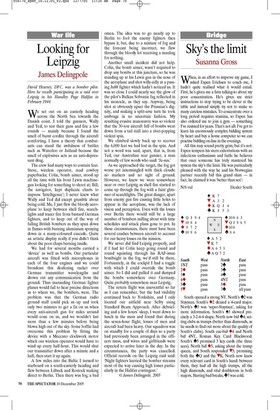Looking for Leipzig
James Delingpole
David Hearsey, DFC, was a bomber pilot. Here he recalls participating in a raid over Leipzig in his Handley Page Halifax in February 1944.
We set out on an easterly heading across the North Sea towards the Danish coast. I told the gunners, Wally and Ted, to test their guns and fire a few rounds — mainly because I found the smell of burnt cordite through the aircraft comforting. I have a theory that combatants can stand the awfulness of battles such as Waterloo or Jutland because the smell of explosives acts as an anti-depressant drug.
The crew had many ways to contain fear. Steve, wireless operator, read cowboy paperbacks; Colin, bomb aimer, stood up all the time with his front Lewis machinegun looking for something to shoot at; Bill, the navigator, kept duplicate charts to impress ‘Intelligence’; I never knew what Wally and Ted did except grumble about being cold. Me, I just flew the bloody aeroplane to keep between shell fire, searchlights and tracer fire from bastard German fighters, and to keep out of the way of falling British bombers as they spun down in flames with burning aluminium spraying down in a many-coloured cascade. Quite an artistic display really if you didn’t think about the poor chaps burning inside.
We had for several months carried a ‘device’ as well as bombs. Our particular aircraft was fitted with microphones in each of the four engines and we could broadcast this deafening racket over German transmitter wavelengths and drown out any communication from the ground. Thus marauding German fighter planes would fail to hear precise directions as to where we, the bombers, were. The problem was that the German radio ground staff could pick us up and took only two minutes to get a fix on us when every anti-aircraft gun for miles around would cone on us, and we wouldn’t last more than a few minutes before being blown high out of the sky. Some boffin had overcome this problem by fitting the device with a Meccano clockwork motor which our wireless operator would have to wind up every half-hour. This would shut our transmitter down after a minute and a half, then start it up again.
A few miles into the Baltic I turned to starboard on a south-easterly heading and flew between Lübeck and Rostock making direct to Berlin. Then there was fog, a bad omen. The idea was to go nearly up to Berlin to fool the enemy fighters then bypass it, but, due to a mixture of fog and the forecast being incorrect, we flew through the bloody lot receiving a mauling for nothing.
Another small incident did not help. Colin, the bomb aimer, wasn’t required to drop any bombs at this juncture, so he was standing up at his Lewis gun in the nose of the aeroplane and shot willy-nilly at a passing Ju88 fighter which hadn’t noticed us. It was so close I could nearly see the glow of the pilot’s Balkan Sobranie fag reflected in his monocle, as they say. Anyway, being shot at obviously upset the Prussian’s dignity, and making a split-arse turn he took umbrage in no uncertain fashion. My resulting evasive manoeuvre was so violent that the 30-ton aircraft full of bombs went down from a tail stall into a rivet-popping violent spin.
We climbed slowly back up to recover the 6,000 feet we had lost in the spin. And not a word was said, apart, that is, from Ted, our Australian rear gunner, a man normally of few words who said: ‘Je-sus.’ As we approached the target, the fog got worse yet intermingled with thick clouds; no markers and no sight of ground. However, we knew we were somewhere near or over Leipzig as shell fire started to come up through the fog with a faint glimmer of searchlights. The great danger, apart from enemy gun fire causing little holes to appear in the aeroplane, was the lack of vision and perception. Even with the losses over Berlin there would still be a large number of bombers milling about with time schedules and attack plans gone to pot. In these circumstances, there must have been several crashes between aircraft to account for our heavy losses on the mission.
We never did find Leipzig properly, and if I had let Colin keep going round and round squinting through his RAF-issue bombsight in the fog, we’d still be there. Fortunately, in the cockpit I had a toggle with which I could override the bomb aimer. So I did and pulled it and dumped the bombs somewhere over Germany. Quite probably somewhere near Leipzig.
The return flight was uneventful so far as I can remember, but the bad visibility continued back to Yorkshire, and I only located our airfield near Selby using Standard Beam Approach. After debriefing and a few hours’ sleep, I went down to lunch in the mess and found that during the seven-hour flight, losses of men and aircraft had been heavy. Our squadron was on standby for a couple of days so a party had previously been arranged in the officers mess, and wives and girlfriends were expected to arrive later in the day. In the circumstances, the party was cancelled. Official records on the Leipzig raid said: ‘Night fighters harried the bomber streams most of the way causing high losses particularly in the Halifax contingent.’
© James Delingpole, 2005

























































 Previous page
Previous page